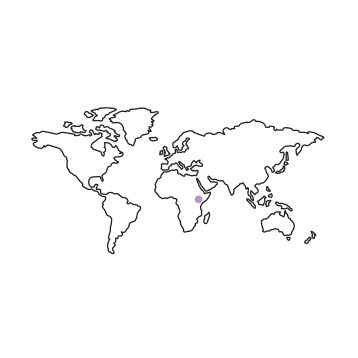Country: KENYA
Region: Embu Town, Kirinyaga County, Central Province
Owners: Members of Kiamutira Washing Station
Altitude: 1,750 metres above sea level
Variety: SL28, SL34 and Ruiru 11
Processing: Washed
Sparkling citrus acidity with maple syrup sweetness. Raisins, toffee and red currants.
About Kiamutira (with thanks to Melbourne Coffee Merchants)
Mutira Farmers Cooperative Society is found in Kirinyaga county on the expansive slopes of Mount Kenya in Kenya’s Central Province. The Cooperative Society has been operating for over 60 years.
Secretary Manager Mr Boniface Muchiri oversees the day to day operations. Member washing stations are Mutitu, Ngorano, Mugaya, Karii, Kiangundu, Kiamutira, and finally Kagumo washing station where the cooperative head quarters and offices sit. This coffee was processed at the Kiamutira Cooperative.
The farmer members of the society are trained in Good Agricultural Practices, and have undergone certifications with UTZ, 4C, Rainforest Alliance and FairTrade.
Mutira is currently receiving assistance from Coffee Management Services (CMS), who have been on the ground directly helping producers improve their productivity and quality through training and education programs. Through the program, farmer members of the society have been trained in Good Agricultural Practices focused on sharing the most up to date material relating to sustainable farming practices.
The Mutira Cooperative’s belief’s lies strongly in establishing a transparent and trust-based relationship with the smallholder farmers, helping to support sustained industry growing and continuing to elevate the standards of quality coffee produced in Kenya.
Coffee varieties grown by members are SL28, SL34 (90%) and Ruiru 11 (10%), and growers benefit from the high altitudes averaging 1750m above sea level, and rich, red soils typical of the area. After picking, the ripe cherry is brought to the factory by smallholder farmers. At Kiamutira it is weighed and then loaded into a de-pulping machine. After removing the outer fruit of the coffee, the beans are fermented for 12 to 24 hours, and then carefully washed and sorted by weight, with any lower density or lower grade beans removed. They are then sent to soaking tanks where they sit under water for a further 24 hours. This process increases the proteins and amino acids, which in turn heightens the complexity of the acidity. After soaking, the coffee is laid out to dry on raised beds for seven to 15 days.

